Capacity Development Forum 2021
Design and Delivery of Individual Capacity Building Programmes
08 and 09 December 2021 | Virtual Convening

Design and Delivery of Individual Capacity Building Programmes
08 and 09 December 2021 | Virtual Convening
The IIHS Urban Practitioners’ Programme has been driving urban transformation in India through diverse capacity development projects and programmes at the state and national levels across a range of sectors, working with various national and state institutions and development agencies, and partnering with other capacity development and consulting and training institutions and experts.
Through the Capacity Development Forum (CDF), IIHS aims to bring together the diverse stakeholders involved in the capacity development arena into a strong and value-added network to consolidate learnings across the country and from around the world. The longer term objective of the forum is to collaborate not only for making our Capacity Development practices better, but also to build and manage knowledge through research papers and action research projects, and create a repository of knowledge on Capacity Development.
Strengthening individual capacities contributes to building institutional capacities, and helps drive change and transformation in society and the economy. It is hence important to explore how capacity development institutions can improve their initiatives and programmes to ensure effective capacity building of individuals. The COVID-19 pandemic disrupted capacity development, in terms of restricting physical interactions, peer learning, and field visits, among others.
The first convening of the CDF, held virtually on 8 – 9, December, 2021, focused on the capacity development of urban practitioners at an individual scale, across different sectors of the Urban. Conversations were grounded in the context of the ongoing pandemic and its impact on capacity development programmes and how this has impacted the shift to online modes of delivery, the choice of pedagogical tools and technological solutions, and the overall outlook for future CD practice.
| Day 1 – Wednesday, 08 December 2021 | |
| Time | Session Title and Key Discussion Points |
| 14:00 – 14:05 hrs | Welcome note
Introduction to the convening series |
| 14:05 – 14:30 hrs | Presentation: Setting the Context: Capacity Building for Urban Development in India |
| 14:30 – 14:50 hrs | Dialogue: How individual capacity building can develop institutional capacities in urban India and the Global South |
| 14:50 – 15:00 hrs | Break |
| 15:00 – 15:45 hrs | Discussion 1: Pedagogical tools for individual capacity building – Learners’ experiences |
| 15:45 – 16:45 hrs | Discussion 2: Pedagogical tools for individual capacity building – Trainers’ perspective |
| 16:45 – 16:55 hrs | Reflections – Day 1 |
| 16:55 – 17:30 hrs | Online networking in groups |
| Day 2 – Thursday, 09 December 2021 | |
| 14:00 – 14:30 hrs | Guest Speaker: Theory of Change in Capacity Building for Urban Development – Challenges and Opportunities |
| 14:30 – 15:20 hrs | Panel 1: Models, types and components of individual capacity building programmes |
| 15:20 – 15:30 hrs | Break |
| 15:30 – 16:20 hrs | Panel 2: Online and blended Capacity Building Programmes |
| 16:20 – 16:50 hrs | Closing lecture: Capacity Building and leadership |
| 16:50 – 17:00 hrs | Vote of Thanks and Closing |
Setting the Context: Capacity Building for Urban Development in India
The first session of the convening set the context of capacity building in the Indian urban development sector. The objective of this session was to gain an overview of state capacities by looking at the past and present trends of capacity building practices and discussing the implications for capacity building and skills development in the urban development sector.
Speaker:
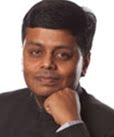 Aromar Revi
Aromar Revi
Aromar Revi is the founding Director of the Indian Institute for Human Settlements (IIHS).
Aromar has over 30 years of experience in public policy and governance, the political economy of reform, development, technology, sustainability and human settlements. He has led or been part of several global research projects. He is a member of the Leadership Council of the UN Sustainable Development Solutions Network (SDSN) and co-chair of its Urban Thematic Group, and a reputed global expert on sustainable urban development.
He has been a senior advisor to multiple ministries of the Government of India since the late 1980s; and consulted with international development institutions, national and transnational firms on economic, environmental and social change at global, regional and urban scales. This includes the UN, and multilateral and bilateral agencies: UNDP, UNICEF, UNEP, UN Habitat, UNDRR, UNU; World Bank, ADB, DFID, CIDA, SIDA, SDC, NORAD, GiZ, IDRC and AusAID.
How Individual Capacity Building Can Develop Institutional Capacities in Urban India and the Global South
This dialogue focused on the role that capacity building plays in the context of the Global South and specifically in urban India, with discussants sharing their experiences from working in the development sector over several decades. Capacity building initiatives that have a clearly defined purpose are the most likely to bring about transformation and help in the success of developmental projects.
Guest:
 William (Billy) Cobbett
William (Billy) Cobbett
William (Billy) Cobbett is the former Director of Cities Alliance, a global partnership for urban poverty reduction and promotion of the role of cities in sustainable development. He joined the Cities Alliance in 2001 after serving as acting Chief of the Shelter Branch at the United Nations Human Settlements Programme (UN-Habitat), where he designed and launched the Global Campaign for Secure Tenure.
Prior to joining UN-Habitat he held numerous positions in his native South Africa, including Director of Housing for the City of Cape Town, Director-General of the National Department of Housing, and National Coordinator of the Department of Local and Regional Government, and Housing, for the African National Congress. He began his urban career as Coordinator of Planact, an urban NGO in Johannesburg.
Pedagogical Tools for Individual Capacity Building: Learners’ Experience
This session brought together learners from various IIHS capacity building programmes spanning a range of topics and formats and adopting a variety of pedagogical approaches and methods. The format of these programmes included online, offline and hybrid. They involved different pedagogical approaches such as classroom instruction, flipped classrooms, case studies, audio visual aids, site visits, group discussions, mentorship and handholding. The objective of this session was to gather learner impressions on which pedagogical methods and approaches worked better in their respective learning contexts.
Pedagogical Tools for Individual Capacity Building: Trainers’ Perspective
This panel discussed pedagogical methods and approaches that trainers have adopted over time, and sustainable models that have evolved in individual capacity building. In the context of COVID induced restrictions, the panel discussed changes to the design and delivery of capacity development programmes.
In the course of their discussions, the panellists touched upon the following key topics:
Discussants:
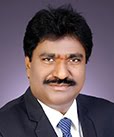 G Rameshwar Rao
G Rameshwar Rao
G Rameshwar Rao is a professional with over 40 years of experience in the engineering discipline (Water supply & Sewerage). He has a doctoral degree from Osmania University. He has worked with Hyderabad Metropolitan Water Supply & Sewerage Board (HMWSSB) in various positions including the cadre of Chief General Manager. Presently, he is the Director of Engineering Staff College of India (ESCI) since August 2020 and effectively steering its activities.
During his tenure as Chairman, Telangana State Centre of The Institution of Engineers (India) (IEI) was awarded as the “Best State Centre” for the best all-round performance for the year 2018-2019 and 2019-2020 successively. Dr Rao has been in association with IEI for more than 34 years. Earlier in 2016, he was chosen as the first Hon. Secretary of the new Telangana State Centre after bifurcation.
He has presented more than 25 papers on the subject of Drinking Water Supply & Sewerage systems in various National and International conferences and has also delivered many guest talks as an Invitee.
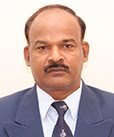 Kota Tirupataiah, IFS
Kota Tirupataiah, IFS
Kota Tirupataiah, IFS, is a Professional with over 34 years of Regulatory, Administrative and Development experience. He has a Doctoral degree from the Indian Agricultural Research Institute (IARI) New Delhi in Ag. Extension. He was selected to the Indian Forest Service in 1986 and he worked not only in Forest Department but also in Social Welfare, Tribal Welfare Departments (ITDAs), Finance & Planning Department (Planning Wing), Rural Development Department, Irrigation & Command Area Development Departments. He has over three decades of experience in Capacity Building and Training Management in State Institute of Rural Development, Water and Land Management Training & Research Institute (WALAMTARI), Telangana State Forest Academy and Dr Marri Channa Reddy Human Resource Development Institute (Dr. MCR HRDIT).
He contributed as a member to the drafting of Guidelines for MGNREGS as well as Integrated Watershed Management Projects of MoRD, GoI. He has over 25 papers presented in National/International Journals, Seminars/Workshops and Co-Authored 3 Chapters in Water and Climate Change.
He specialised in training management and teaching “The 7 Habits of Highly Effective People” as a course to All-India Services, Central Civil Services officers and others. Post-retirement, he is working as Chief Consultant (Training) at Dr. MCRHRDIT, Hyderabad.
 Valli Manickam
Valli Manickam
Valli Manickam, is Professor and Area Chairperson, Environment Area, CEEUGID, and Centre Director, Centre for Information Technology, and also currently Dean of Training Programmes in ASCI. She has a PhD in Environment and a Master in both Computer Applications and Sciences, with over 25 years of research and teaching experience in the field of Environmental Science and Technology.
She has worked for several environmental projects and activities which include environmental impact assessment study, lake Remediation technologies, risk assessment, common effluent treatment plants, air pollution assessment studies, weather modification operations, and climate change.
She has co-authored six books in the field of environment and climate change. She has published around 32 papers in peer-reviewed journals and also presented papers in various international conferences and workshops. She was awarded Associate Fellow of the AP Academy of Sciences in 2010 and Fellow APAS in 2015 for her contribution to the field of Environmental Engineering and Technology.
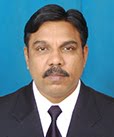 Vijay Kumar
Vijay Kumar
Vijaya Kumar is Associate Professor & Training Coordinator in NIRDPR-NIRC, Guwahati. He has a PhD in Education and M.Sc. in Psychology with over 30 years of experience teaching and training.
He is an expert in the psychology of rural development, development management, behavioural and organisational development, community resource mapping and social sector development (Poverty, Literacy, Education and Health).
He has co-authored ten books in the field of rural development and development management. He has published around 40 papers in peer-reviewed journals and recently delivered a panel session on inclusive education at the International Conference on Journey of Teacher Education Local to Global (Silver Jubilee Celebrations of NCTE), Aug 2019, Govt. of India. He was awarded the best teacher award in 1999.
Theory of Change in Capacity Building for Urban Development: Challenges and Opportunities
In this session, a retired civil servant with experience across sectors presented the practitioner’s perspective on implementing schemes and in policy making, and shared some thoughts on the Theory of Change in capacity building aimed at urban transformation. Speaking from his experience of implementing the Community Led Total Sanitation (CLTS) Scheme across the state of Himachal Pradesh, the speaker said that the key to affecting change lies in influencing the behaviour of individuals and in getting the community to take ownership of its own problems.
Speaker:
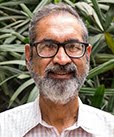 Deepak Sanan
Deepak Sanan
Deepak Sanan is a former civil servant, living in Himachal Pradesh. He retired from the Indian Administrative Service, the centrally recruited senior civil service of India in January 2017. He was posted in the state of Himachal Pradesh in 1982. During the course of his career, he held positions that offered experience in public finance, rural development, cooperatives, water resources and sanitation, health and medical education, urban development, housing, town planning, land administration, power, animal husbandry, agriculture and forests and environment, both to the State Governments and the Government of India.
Deepak Sanan has published regularly on Center-State relationships, in particular, on creating incentives for more effective use of Central funds to overcome State budget constraints and improve governance. He has a special interest in designing schemes of inter-governmental financial transfers that can improve institutional arrangements at state and local government level to enhance the effectiveness of these transfers and service delivery specially, in basic services. He has undertaken many assignments over the years as a consultant with the World Bank, IFAD, DFID, IDS Sussex and AusAid relating to his skills and experience in public finance, urban and rural development and specially in relation to the water and sanitation sector in India. He has also been on the staff of the World Bank as the India Country Team Leader in the Water and Sanitation Program (South Asia) for two years, between 2005 and 2007.
He currently advises the Indian Institute for Human Settlements, Bangalore on a variety of subjects related to his experience and special interests, such as Land Governance, and issues relating to urban development, water, sanitation and public finance issues.
Models, Types and Components of Individual Capacity Building Programmes
This expert panel discussed capacity building in different contexts, examples of innovative capacity development initiatives, extended capacity building models to include components like mentoring and handholding, the need for programme design to incorporate a bottom up approach, an institutional environment conducive to utilising built capacities, and ways in which individual capacity development can bring about large-scale change.
Panellists:
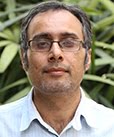 Amir Bazaz
Amir Bazaz
Amir Bashir Bazaz is Senior Lead-Practice at IIHS. He is also the Associate Dean – School of Environment and Sustainability, and School of Systems and Infrastructure at IIHS. He holds a PhD in Management from the Indian Institute of Management Ahmedabad, with a specialisation in Public Systems. He works on issues at the intersection of economics, climate change mitigation, and adaptation and sustainable development. He has substantial experience in working with various integrated assessment frameworks and modelling arrangements. His current research interests are low carbon societies/infrastructure, climate change adaptation and mitigation (across scales), with specific focus on urban-climate change linkages and climate, energy and environment policy.
Amir has a first degree in Electrical Engineering from Indian Institute of Technology Roorkee and started his career in the manufacturing industry, working across functional responsibilities of projects, production planning/control and engineering. He has previously been the National Expert Consultant to the Ministry of Environment, Forests and Climate Change, Government of India for the Second National Communication to the UNFCCC and taught courses in Development & Environmental Economics during his academic engagements at Symbiosis International University, Pune.
At IIHS, Amir is the Regional Research Lead for a multi-partner, multi-year climate adaptation research project – Adaptation at Scale in Semi-Arid Regions (ASSAR), a part of an IDRC/DfID funded global climate adaptation research program. In addition, Amir is a part of many practice-based engagements at IIHS, notably; on ‘Energy Innovation’ (on a project led by Cambridge University), ‘Sustainability of Ecosystem Services’ (in collaboration with the Nature Conservancy India and Keystone Foundation) and ‘Migration-Climate Resilience dynamics for Indian cities’ (supported by the Swiss Agency of Development & Cooperation). He has been a regular team member for many ‘Disaster and Climate Resilience’ projects at IIHS and teaches regularly in the Urban Fellows and the Urban Practitioners’ Programme.
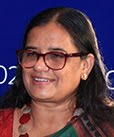 Aparna Das
Aparna Das
Aparna Das is an urban planning professional working as a Senior Advisor with GIZ, India, for the last ten years. She received her master’s degree in Urban Development Planning from Development Planning Unit (DPU), University College London (UCL), in 2000. Aparna received a SPURS fellowship (2018-19) located within the Department of Urban Studies and Planning (DUSP), Massachusetts Institute of Technology (MIT). At MIT, she focused on urbanisation aspects in the Global South and explored methodologies for efficiently distributing economic resources and achieving spatial justice in urban areas.
Aparna has more than 20 years of work experience with different sector partners; national, state and city governments, national and international NGOs, and multi and bilateral agencies such as UNICEF, UNDP, DFID India, and the World Bank. Her key sectors of experience are affordable housing, municipal governance, basic urban services, urban planning, and in situ slum upgrading and linkages of these thematic areas with the land legislation and land tenure in urban areas.
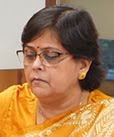 Debjani Ghosh
Debjani Ghosh
Debjani Ghosh is a social scientist with a Masters and PhD in Planning with over 20 years of professional experience in the field of development planning. Presently working as Associate Professor, National Institute of Urban Affairs, New Delhi, she leads the projects related to sustainable planning and capacity building. Her interest and core area of work has been to engage with stakeholders working in knowledge exchange, sharing and management both within and outside India. Some of her key projects include the South Asia Urban Knowledge Hub supported by ADB at NIUA whose primary activity was to promote evidence-based research in 4 South Asian countries to influence change in urban policies and practice through collaboration and knowledge management.
As well, she leads the Capacity Building for Smart Data and Inclusive Cities project in partnership with IDS Sussex, UK; Morgenstadt Global Smart Cities Initiative with Kochi Smart City Limited and University of Stuttgart, Germany and the monitoring and assessment of Integrated Capacity Building Programme as a strategic partner for Ministry of Housing & Urban Affairs, Government of India.
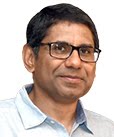 Parth Shah
Parth Shah
Parth is the founder of Centre for Civil Society and co-founder of Indian School of Public Policy. He has long championed education reform ideas, which have been adopted in RTE and NEP 2020: fund students, not schools, regulation based on learning outcomes and not inputs, and separation of functions. In the domain of capacity building, he works with college students to get them interested and excited about public policy, has done workshops with national and state government academies and is now developing a Hinglish course in public policy to democratise policy education.
Online and Blended Capacity Building Programmes
This session sought to explore the different ways in which the pandemic has affected the design and delivery of capacity development programmes, the impact on learning especially from the urban practitioner’s perspective, the way forward for capacity building institutions in the post-pandemic situation, and the conceptualising and delivery of online capacity development programmes at scale by keeping the community in focus rather than the individual, and by democratising content for wider dissemination.
Panellists:
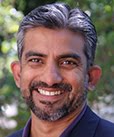 Anand Arkalgud
Anand Arkalgud
Anand is a founding partner of Socion ( www.socion.io ), a social enterprise with a mission to reimagine the way we collectively pursue and resolve societal challenges at scale. Socion partners with social missions (across sectors) and governments to re-orient their efforts to reach and enable development outcomes at scale, and also offers a Participatory Digital Attestation platform that empowers Frontline Workers, Program Administrators and the State to realize their aspirations while enhancing transparency and accountability across the ecosystem.
Anand is also a Board member of Catalyst 2030 (https://catalyst2030.net/ ), a global movement of social entrepreneurs and social innovators from all sectors who share a common goal of creating innovative, people-centric approaches to attain the Sustainable Development Goals by 2030.
 Chandrika Bahadur
Chandrika Bahadur
Chandrika Bahadur is the Founder-Director of the SDG Academy and Vice President of Education at the UN SDSN. She serves as the Chair of the Lancet Commission on COVID 19 India Task Force. Previously, she was President of SDSN Association. From 2008-2011, she was advisor to the Chairman and Managing Director at Reliance Industries, where she helped set up Reliance Foundation. From 2001-2008, Chandrika worked with the United Nations in different roles. In her last assignment, she was a Policy Advisor at UNDP’s Bureau for Development Policy in New York, working in Africa to help Ministries of Finance and Planning align their strategies to the Millennium Development Goals (MDGs), across 20 countries. From 2003-2006, she was part of the leadership team of the UN Millennium Project, an advisory group convened by the then UN Secretary-General Kofi Annan to recommend strategies for the MDGs. She has prior teaching experience at Harvard and Columbia Universities.
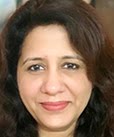
Kakul Misra
Kakul Misra is the National Programme Head for National Urban Learning Platform (NULP) at National Institute of Urban Affairs (NIUA). Kakul is an IIM Bangalore alumnus. In her 2 decades plus of experience she has been an advocate for impact – based transformation. She has worked in both developed and developing economies with the public and private sector to drive this passion. Her leading projects have impacted key development and business outcomes for the stakeholders. This includes leading a program for a large PPP ecosystem to drive service excellence making it #1 Airport globally and a business transformation program for a bank launch, which won the prestigious global award of Brandonhall for Best Learning Program Supporting a Change Transformation Business Strategy.

Suresh Kumar Rohilla
Suresh Kumar Rohilla has over 25 years of experience working with national / international NGOs, government and academics. He leads the water programme at Centre for Science and Environment, New Delhi. He is involved in policy advocacy, research and capacity building aimed at mainstreaming water and environmental sustainability in South Asia and Africa. He is Head of the Centre of Excellence in Urban Development sustainable Water Management Area of the Ministry of Urban Development and the National Key Resource Centre of the Ministry of Drinking Water Supply and Sanitation, Government of India. Some of his previous assignments include – Director Environment & Development (Living Ganga Programme) at World Wide Fund for Nature – India; Associate Professor (Environment Management and Sustainability) at Administrative Staff College India, Hyderabad and Lecturer in Environment Management and Sustainability at University of Bradford, U.K; Director (Technical) at the National Capital Regional Planning Board, Ministry of Urban Development and Director – Natural Heritage Division, Indian National Trust for Art and Cultural Heritage (INTACH), India. He holds a doctoral degree from Queen’s University Belfast and post graduation degree(s) from Jawahar Lal Nehru University and School of Planning & Architecture, New Delhi. He is recipient of the British Chevening Indian Young Environmental Manager Fellowship (2001), Fulbright Nehru Environmental Leaders Programme Fellow (2012) and Government of Netherlands Fellowship (2014). He has been an affiliated Visiting Professor /Researcher at University of California – Berkeley in U.S.A.
Capacity Development and Leadership
This dialogue, between Manish Dubey, Chief-Practice at IIHS, and the guest speaker, Vidya Bhushan, IAS, focused on improving the effectiveness of capacity development programmes to address gaps in leadership skills, the characteristics of leaders and the role of leadership in creating enabling conditions for institutions to use built capacities.
Focussing on the role of leadership and capacity development for leaders, the discussants agreed that in moulding leadership values in a person, attitudes and behaviour are very important aspects that play a central role in shaping the identity of individuals, and their behaviours and competencies.
Guest:
Vidya Bhushan, IAS



